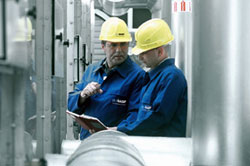When you have a broken toilet or a clogged drain, you should call a plumber to fix the problem, since you may not be a plumbing engineer. It is important to note that plumbing engineer jobs are not the same as plumbing jobs. In simple words, a plumbing engineer designs the system, while the plumber maintains the system. Plumbing engineer jobs and responsibilities overlap mechanical, chemical and civil engineering. Such an engineer is in a position to influence water efficiency, energy, pollution systems, sustainable sites and fire protection of a facility.
Job description of a plumbing engineer
Traditionally, plumbing engineer jobs involve calculations, sizing of equipment and preparation of plumbing designs and construction documents. Note that this is done under the supervision of a civil, mechanical, fire protection or a professional engineer. In most states, the mechanical engineer supervises plumbing engineer jobs in the following areas:
- Designing of plumbing systems
- Designing of energy and heat transfer systems
- Designing of fluid flow and process systems
The plumbing engineer works with the civil engineer when designing plumbing systems that are outside the building or structure. These include storm water, natural gas, domestic water, sewer, fire suppression water, irrigation water and other water systems. When it comes to designing fire suppression sprinklers, the plumbing engineer has to work closely with the fire protection engineer and consider the whole building.
These jobs and responsibilities vary depending on the type and size of the project as well as the organizational structures of the engineering firm. If the design of the building makes use of more sustainable systems, the engineer has to interact with the respective designers and specialists. Due to this overlap of plumbing engineer jobs and other engineering jobs, it is vital to have the plumbing engineer at the onset of the project.
Areas where plumbing engineers provide input
Several areas require a plumbing engineer’s input including:
- Plumbing fixtures; the engineer coordinates the use of appropriate fixtures in various parts of the building for flow rate control.
- Domestic hot water systems
- Domestic water system; here the engineer’s work is to design the water distribution system keeping the whole building in mind for the sake of public health and other factors.
- Sanitary sewer systems
- Storm water systems
Becoming a plumbing engineer
To become a qualified plumbing engineer, you should attend college and obtain a bachelor’s degree in mechanical engineering from an accredited learning institution. While at school, choose the coursework you are required to complete, while having plumbing in mind. You may opt to take a course such as fluid mechanics and fluid systems. Then you can look for internships in construction companies or with water companies.
You will realize that most plumbing engineers obtain their training through apprenticeships, since here they receive training that is more comprehensive. After obtaining formal education, you are required to obtain a license before applying for plumbing engineer jobs.

- Home
- Types Of Jobs In Plumbing
- City Plumbing Jobs
- Commercial Plumbing Jobs
- Construction Plumbing Jobs
- Emergency Plumbing Jobs
- Mechanical Plumber Jobs
- Offshore Plumbing Jobs
- Plumbers Mate Jobs
- Plumbing And Heating Jobs
- Plumbing Apprentice Jobs
- Plumbing Contractor Jobs
- Plumbing Engineer Jobs
- Plumbing Engineering Jobs
- Plumbing Estimator Job
- Plumbing Foreman Jobs
- Plumbing Helper Jobs
- Plumbing Jobs Overseas
- Plumbing Maintenance Jobs
- Plumbing Related Jobs
- Plumbing Sales Jobs
- Plumbing Subcontractor Jobs
- Plumbing Supervisor Jobs
- Plumbing Teaching Jobs
- Trainee Plumber Jobs
- Jobs In Plumbing Information
- Jobs In Plumbing USA
